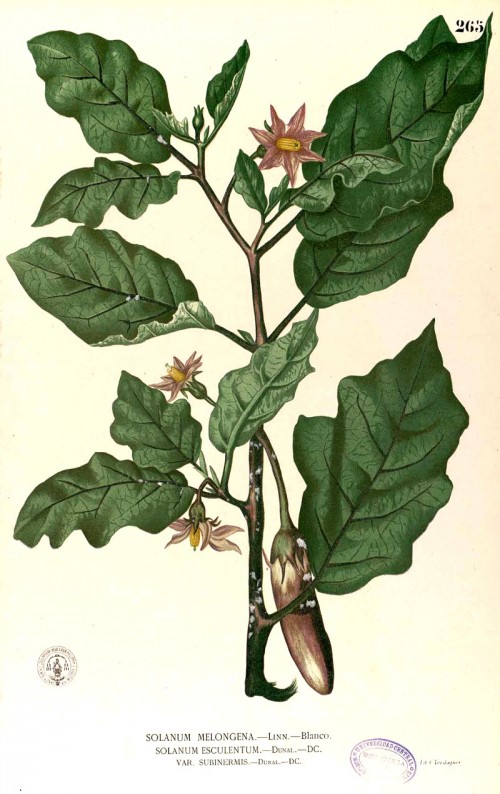Dies ist eine alte Version des Dokuments!
Solanum melongena L. - Solanaceae - aubergine, eggplant, Aubergine, Eierfrucht
only known in cultivation (vegetable)
„The raw fruit can have a somewhat bitter taste, but becomes tender when cooked and develops a rich, complex flavor… The fruit is capable of absorbing large amounts of cooking fats and sauces, making for very rich dishes, but salting reduces the amount of oil absorbed. Eggplant, due to its texture and bulk, can be used as a meat substitute in vegan and vegetarian cuisine.“
[http://en.wikipedia.org/wiki/Eggplant]
Fresh aubergine owns a very low concentration of aroma volatiles (ca 2.4 μg/kg), with hydrocarbons comprise over 70% of, including 20 acyclic alkanes.
[Aroma volatiles of aubergine (Solanum melongena)., MacLeod, A.J., De Troconis, N.G., Phytochemistry, Vol.22(9), 1983, 2077-2079]
„Phytochemical investigation of the eggplant extracts showed that N-caffeoylputrescine, 5-caffeoylquinic acid, and 3-acetyl-5-caffeoylquinic acid made up the bulk of total eggplant phenolics… Eggplant extract inhibition of cupric-ion mediated oxidation of low-density lipoproteins was highly correlated with the content of 5-caffeolquinic acid (R2 = 0.9124), the most abundant phenolic acid identified.“
[Polyphenols content and antioxidant capacity of eggplant pulp., Singh, A.P., Luthria, D., Wilson, T., Vorsa, N., Singh, V., Banuelos, G.S., Pasakdee, S., Food chemistry, Vol.114(3), 2009, 955-961]

Blanco, M., Flora de Filipinas, t.263 (1875)
http://plantgenera.org/species.php?id_species=957185
